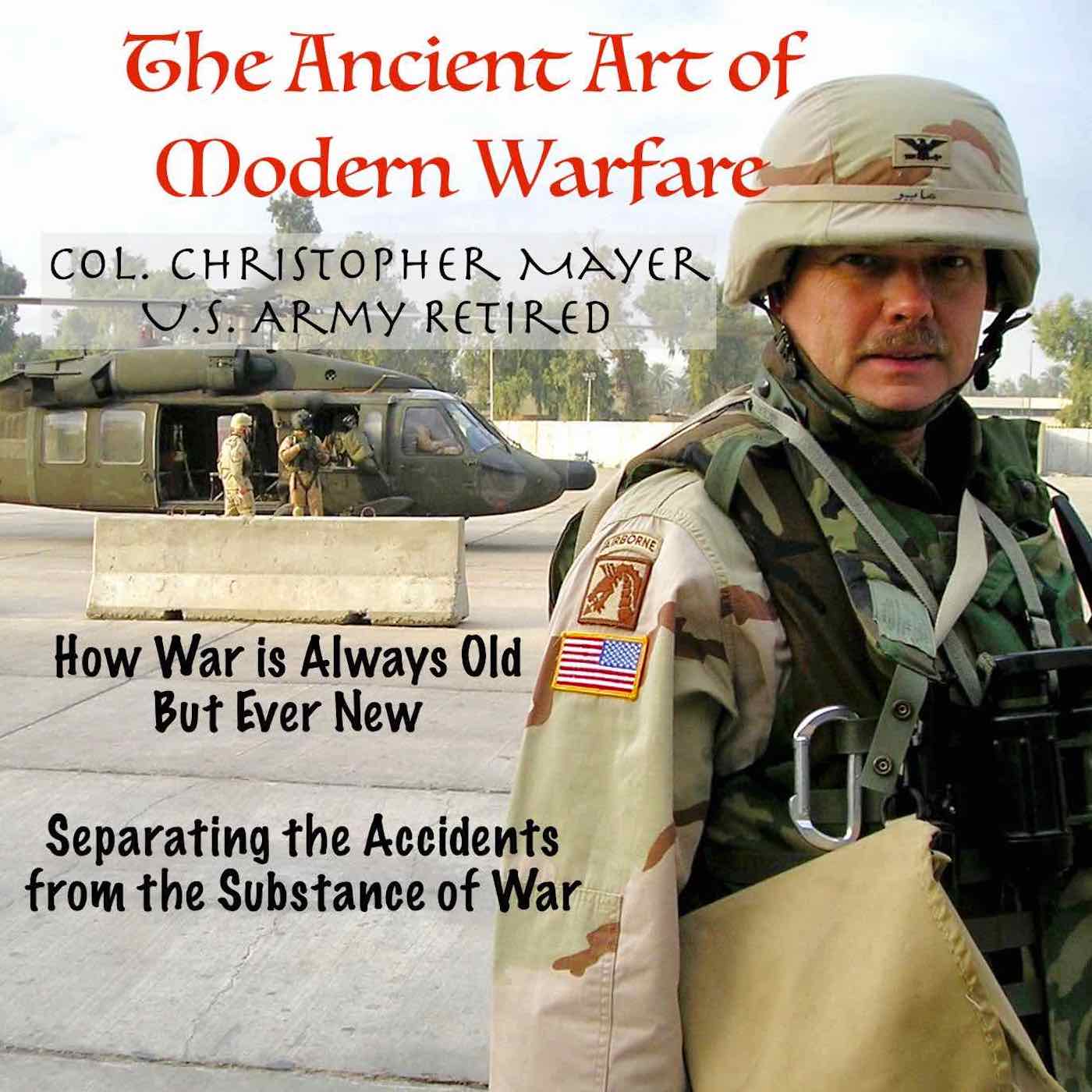Episodes
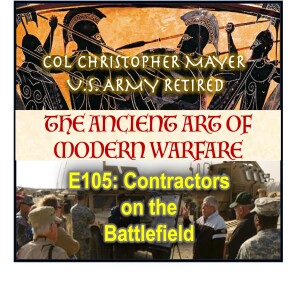
Sunday Nov 17, 2024
E105 Contractors on the Battlefield
Sunday Nov 17, 2024
Sunday Nov 17, 2024
Last week, I attended the annual “Summit” meeting of the International Stability Operations Association, or #ISOA. This association includes 200 private corporations that support U.S. and friendly government engagement across the spectrum of stability, conflict, and post conflict operations. Presentations included speakers from the US Departments of Defense, State, Justice, Commerce, and USAID. Other speakers included representatives of the Ukrainian government, experts in cyber technology and artificial intelligence, and speakers representing companies currently providing private sector support in hostile environments, such as #Ukraine. The subject material was fascinating for what was said, and sometimes what was not said. A continuous stream of thought was why we were there. Why was it that these government agencies use private sector support in armed conflict, post-conflict, and disaster relief. That is the subject of this episode of the Ancient Art of Modern Warfare.
Disclaimer: The information in these podcasts is my own opinion and does not represent that of the Department of Defense, ISOA, or any other organization I am or have been affiliated with.
Reference: Kramer, F., The sixth domain: The role of the private sector in warfare, Atlantic Council (October 2024); https://www.atlanticcouncil.org/in-depth-research-reports/report/the-sixth-domain-the-role-of-the-private-sector-in-warfare/
Music:
- Holst, G, The Planets, Mars Bringer of War Internet Archives, https://archive.org/details/GustavHolstThePlanetsMarsTheBringerOfWar_201709
- Traditional, The Army Strings, Garryowen (Public Domain)
- Kiilstofte, J., The Cavalry, Machinimasound (Licensed)
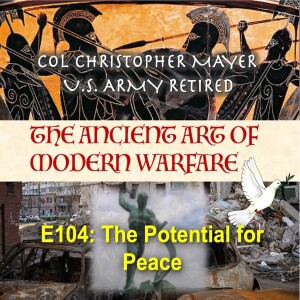
Friday Nov 08, 2024
E104: The Potential for Peace
Friday Nov 08, 2024
Friday Nov 08, 2024
Is a negotiated peace possible, or even desirable between Russia and Ukraine? How can this be done without validating Russia’s invasion of Ukraine and encouragement of future aggression? These are critical questions to address as the incoming U.S. administration states that negotiating an end to that war and our involvement in it as one of its first priorities.
As usual, the opinions in these podcasts are my own and do not necessarily represent the opinion of the Department of Defense, anyone else in the U.S. Government, or any other organization I am or ever have been associated with. (Although, if the Advanced Warfighting Working Group was still in existence, I would probably have convinced the members to endorse this.)
PS: Apologies for the sound of my voice as I am recovering from something or other.
Music:
- Copland, A. & United States Marine Band. (2000) Fanfare for the Common Man, unpublished, Washington, DC. [Audio] Retrieved from the Library of Congress, (Fair use for educational purposes.)
- The Army Strings, GarryOwen (Traditional) (Public Domain)
- Kiilstofte, P., Freedom Fighters, Machinimasound (Licensed)
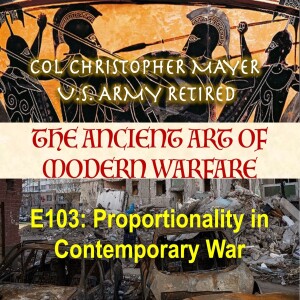
Friday Oct 18, 2024
E103: Proportionality in Contemporary War
Friday Oct 18, 2024
Friday Oct 18, 2024
We often hear that this or that military attack caused disproportionate civilian casualties. Most often, these accusations are directed against Israel, when they are not directed against the United States. I will be generous and presume that most of these accusations are based on a misconception of what proportionality in armed conflict means, and how it is different from proportionate use of force civil or human rights law circumstances. Proportionality in war is the subject of this episode of the Ancient Art of Modern Warfare.
Reference:
- Although a main reference for almost all episodes is On War, by Carl von Clausewitz, a primary reference for this episode is Chapter 5.12 of the Department of Defense Law of War Manual, 2016 edition.
Music:
- Holst, G. The Planets: Mars Bringer of War, downloaded from Internet Archive
- Kilstoffe, Jens, The Cavalry, Machinamasound (Licensed)
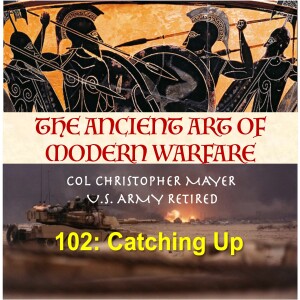
Sunday Sep 29, 2024
E102: Catching Up
Sunday Sep 29, 2024
Sunday Sep 29, 2024
What is the common theme to mercenaries, natural resources, hypersonic missiles, Gaza, and exploding pagers? I can think of several, but in a recent conversation with a colleague of mine, that common thread was challenges to the Law of War, or International Humanitarian Law. Can the notion of the law of war even survive in modern manifestations of armed conflict? I think it can, and it is just as important, if not more so, than in the mythical era of conventional war.
As usual, the views in these podcasts are my own and do not necessarily represent the views of the Department of Defense, any other organization, or any person I am or ever have been associated with.
Music:
- Liszt, Les Preludes, the USMC Band. (Public Domain)
- GarryOwen (Traditional), the Army Strings (Public Domain)
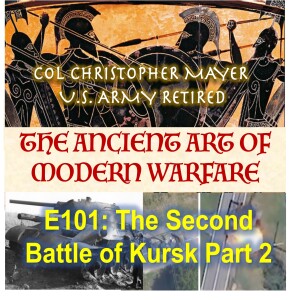
Thursday Sep 05, 2024
E101: Second Battle of Kursk, Part 2
Thursday Sep 05, 2024
Thursday Sep 05, 2024
The fighting in the Kursk Oblast is still ongoing, and it would be much to soon to derive any lessons to be learned from this event. This episode picks up from the previous episode, examining how this campaign might offer examples of concepts presented in previous podcasts of the Ancient Art of Modern Warfare. Ukraine continues maneuver warfare at the tactical level, although as of this writing, nothing approaching the level of decisive action. Russia continues its World War I style offensive in the east, while the south has some interesting long-range strikes. The contrast between attrition warfare in the east and maneuver warfare in the north, combined with drones, deep fires, and partisan activity in Russian occupied areas all indicate that no prior form of warfare is obsolescent and all can exist simultaneously with modern techno-warfare.
Reference: (As always) Clausewitz, C, On War, Edited and Translated by Michael Howard and Peter Paret ©1984
Music:
- Holst, G., The Planets: Mars, Bringer of War (Internet Archives)
- The Army Strings, GarryOwen (Traditional) (Public Domain)
- Kilstoffe, P., Freedom Fighters from Machinimasound

Friday Aug 16, 2024
E100: The Second Battle of Kursk
Friday Aug 16, 2024
Friday Aug 16, 2024
The war in Ukraine has taken a very interesting, and I think, exciting turn of events. The advent of combined arms maneuver warfare reminiscent of armored offensives in that region eight decades ago. It is impossible to conduct an in-depth analysis at this time. There is too much going on and we really know little about order of battle or Ukrainian objectives. StilI, I felt the need to talk about this ongoing battle for a several reasons. Most important of these is that it is an example of the type of maneuver warfare that is possible and should be a feature of this war.
Reference: (As always) Clausewitz, C, On War, Edited and Translated by Michael Howard and Peter Paret ©1984
Music:
- Holst, G., The Planets: Mars, Bringer of War (Internet Archives)
- Kiilstofte, J., The Cavalry, Machinimasound (Licensed)

Sunday Aug 11, 2024
E99: Applying Friction and the Trinity for contemporary War and Peace
Sunday Aug 11, 2024
Sunday Aug 11, 2024
Clausewitz’s descriptions of friction, taken with the often antagonistic interplay among his trinity of passion, policy, and probability, keep war in theory separate from war in practice. How does this look in real war? In this episode, I make my best guess about how friction and chaotic trinity might affect Russia’s “special military operation” in Ukraine.
If you missed the previous two episodes, I recommend that you take the time to do so before listening to this one.
- E97: Friction in War
https://admin5.podbean.com/mayhemxpc/episodes/form/00XlnMhGdsld
- E98: The Paradoxical Trinity of War (and Peace)
https://admin5.podbean.com/mayhemxpc/episodes/form/zpdgaRh85TV2
Reference:
- Clausewitz, C. On War, Book One, Chapter One
(Note that I do not cite a specific publication of On War. I use different translations and the original German. Find a version that work best for you.)
Music:
- Liszt, F. Totentanz; Nebolsin, Eldar(piano), Royal Liverpool Philharmonic Orchestra (Orchestra), Petrenko, Vasily (Conductor) https://www.naxos.com/CatalogueDetail/?id=8.570517 (Chosen because I was looking for chaotic music.)
- The Army Strings, GarryOwen (Traditional) (Public Domain)
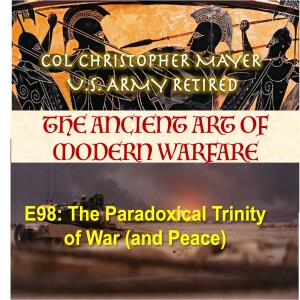
Friday Jul 19, 2024
The Paradoxical Trinity of War (and Peace)
Friday Jul 19, 2024
Friday Jul 19, 2024
Clausewitz wrote that there are three forces at work when a nation goes to war: “unbridled passion,” reason, and the play of chance and probability. Things only work well when each of these is held in equilibrium by the other two. The people, the government, and the military represent these forces and the government should, in theory, maintain that equilibrium. In practice, this never happens. Instead, the interplay among these is random and seemingly chaotic. Each aspect of the nation and the force it represents, must deal with friction within their group and friction from and within the other groups. The pendulum that swings among these power centers is also influenced by external forces including, but certainly not limited to, the enemy. This, with the friction described in the previous episode, adds to the apparent irrationality of war and generates diversions along the path to peace.
Reference:
- Clausewitz, C. On War, Book One, Chapter One
(Note that I do not cite a specific publication of On War. I use different translations and the original German. Find a version that work best for you.)
- Randomly Oscillating Magnetic Pendulum (from the clausewitz.com website.): https://www.clausewitz.com/MP4/romp2.mp4
Music: (Chosen because I was looking for chaotic music.)
- Liszt, F. Totentanz; Nebolsin, Eldar (piano), Royal Liverpool Philharmonic Orchestra (Orchestra), Petrenko, Vasily (Conductor) https://www.naxos.com/CatalogueDetail/?id=8.570517
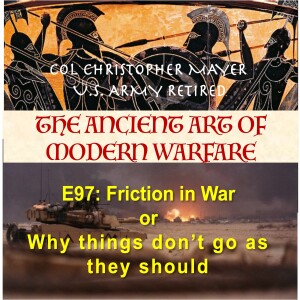
Saturday Jul 13, 2024
E97: Friction in War
Saturday Jul 13, 2024
Saturday Jul 13, 2024
War is really very simple, but Clausewitz cautioned that by saying that in war, even the simplest thing is difficult, sometime insurmountable. This idea, which he called “Friction” he maintained was the one thing that made war in theory different from war in practice. The elements that create friction in war also apply to the effort to move from war to peace; and the primary source of friction? Human nature.
Music:
Wagner, R. and the USMC Band, Siegfried’s Funeral (Public Domain)
The Army Strings, GarryOwen (Traditional) (Public Domain)
Kilstoff, Jan, The Cavalry (Licensed)
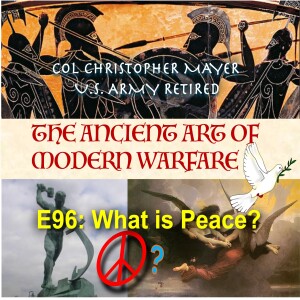
Friday Jun 28, 2024
E96: What is Peace?
Friday Jun 28, 2024
Friday Jun 28, 2024
If the only acceptable outcome of war is a peace, and the only sustainable peace is a just peace, then it is essential to answer the question, “what is peace?” This is a simple question, but without a simple answer. It has been debated from Plato up until the present day. This lack of definition may be one reason why the transition from war to peace is so difficult.
Music:
- Holst, G: The Planets, Mars, the Bringer of War (Internet Archive: https://archive.org/details/GustavHolstThePlanetsMarsTheBringerOfWar_201709)
- Traditional, The Army Strings, Garryowen (Public Domain)
- Wagner, R. and USMC Band, Siegfried’s Funeral March, Public Domain.
Disclaimer: The information in these podcasts is my own analysis and opinion and does not represent the views of the Department of Defense or any organization I am or have been affiliated with.

